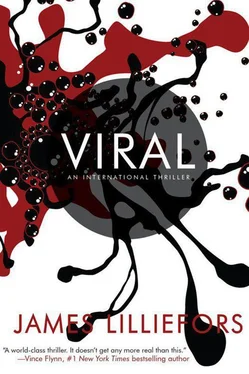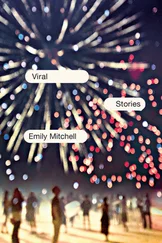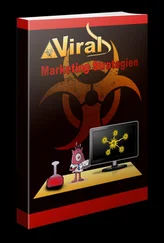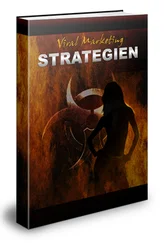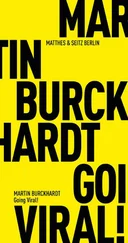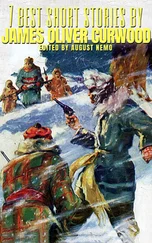“He just saved your life,” Nadra said.
“I know he did.” Charlie turned to Jon, feeling a wave of gratitude toward his little brother. Looking at someone he had never really seen before. He had underestimated Jon, he realized. Not just today. Always. All of his life . He hesitated, then gave him a weak hug.
“Careful,” Jon said.
Charlie stepped back, and for an instant his brother shared a smile with him. Then he heard another engine start. The old Ford station wagon. Jason Wells driving, pulling away from the wall, swinging around and braking.
Nadra got in front. Charlie followed Jon into the back. As they drove out the entrance of the prison compound, he saw the damage the explosives had done, destroying a gatehouse, blowing a twenty-foot-wide hole in the mud-brick wall. He saw the firing range and the obstacle course on the other side of the prison building. A terrorist training camp .
Jon blinked out the window, holding the gun on his lap, saying nothing.
IT WAS SEVEN and a half kilometers to the dirt trail where Joseph Chaplin was parked, waiting for him. That’s what Jon heard. But he had no clear sense of time or distance anymore. He was no longer hurting, but numb, still hearing the echo of the gunfire. His gunfire. Breathing the faint cordite scent of the gunpowder. Replaying the scene over and over.
“I’m sorry, Jonny,” he heard his brother say, in a quiet voice he barely recognized. “I didn’t expect this to happen. I wanted you to be a witness. I didn’t want you to be involved. Not like this. I’m sorry.”
Jon stared out the dust-stained side window as the woods flickered past.
“Why’d you do that?” Charlie said. “Why’d you risk your life like that?”
The questions seemed to reverberate, and disperse, not quite reaching him. He gripped the gun in his hand and felt empowered, felt he could do anything. Then he glanced at his brother and felt something else. “I don’t know,” he said. “I don’t have any idea. Because you were about to be killed, I guess. I don’t know. I just did.” Charlie looked older and more vulnerable. His face had softened slightly. He wasn’t as invincible as Jon remembered.
“I didn’t think about it for more than a second,” Jon said. “Once I started moving, it just happened. I saw that man was desperate. Totally focused on one thing. He wasn’t thinking about me. I wasn’t even on his radar. He was thinking about the scout car. And his own survival. That was all.”
Wells turned his head. “The boy should get a medal.”
“I could never do that again in a million years,” Jon said.
“First time you fired a gun?” Wells said.
Jon didn’t answer. No. Of course not . He was a reporter. Curious about many things. He had twice gone to the indoor shooting range in Rockville to find out what it felt like to fire a gun.
“It’s the first time I’ve fired at another person,” he said. Or killed one .
Ahead, then, he saw their destination: a small, dark car parked on the edge of the road. Joseph Chaplin.
“This time it’ll be different,” Charlie assured him. “Chaplin will take care of you. He’ll give you the rest of the details. And you can write the story. You can tell the story we’ve been working on together. Okay?”
Jon nodded, still gripping the gun. Still hearing the reverberation of the gunshot. Feeling the kick-back in his hand. Not wanting to let go.
JASON WELLS LET Charles Mallory off a couple of blocks west of the city center. It was 5:51. An hour and twenty minutes until dark. Maybe three hours before the planes went up, if they were going up. It was misty, felt like rain. But they couldn’t take anything for granted. Especially not after the night before.
Charlie smelled lamb and pig meat roasting on open spits as he walked back toward his room, his clothes reeking with the scents of death, dried body fluids on his hands and neck. He said a prayer in his head as he walked, thanking God that Jon was alive. He was anxious to just take a shower, to feel the evil wash off him and to be clean again. He wanted things to end now. But he knew that the real mission was still ahead.
As soon as he turned the doorknob to the apartment, though, he realized that something was wrong.
There was a wedge of artificial light on the carpeted floor of the room. Charlie knew that he hadn’t left any lights on when he’d gone out.
Someone was here .
Charlie pulled his 9mm handgun and swung it into the room. Found the target immediately. Sitting in the armchair. Dead center. Hands folded, empty. Charlie’s eyes went to the corners of the room. Then the doorways to the two adjacent rooms.
He felt a charge of adrenaline, knowing he didn’t have back-up anymore.
The man sitting in the chair watched him. Charlie couldn’t place him, but he recognized the face.
He pointed the gun, holding it with both hands—a move designed to rattle the person on the other end. But the man in the armchair didn’t blink.
“Who is it?” Mallory said, keeping the gun on him. Nothing. He studied the figure: a large, dark-complexioned man wearing a dashiki, with short-cropped, curly hair.
“Hi, Mallory,” the man finally said, in a surprisingly calm, flat voice. His accent was from the American South.
Then Charles Mallory realized who it was.
“Don’t worry. I came alone,” Isaak Priest said.
THERE WAS A HANDGUN on the table next to him. A Beretta M9, the make used by military and police officers. But Isaak Priest made no motion to reach for it. Charlie kicked the door closed. He scanned the room quickly for signs of a trap, sensed that there wasn’t one.
“What are you doing here?”
“I realized something, as you got closer,” Priest said, speaking in a familiar voice, a soldier’s voice. “You’re working for the government, aren’t you?
The government .
“They’re supporting you, anyway.”
Charlie remained silent, trying to process his words.
“You know that I’m the wrong target, though, don’t you? You must know that. I’m the target they gave you, aren’t I? You’ve been paid to take me out.”
Mallory just watched him.
“What you want is right there,” Priest said. “It’s right on the table.”
Charlie glanced at the table, kept his gun aimed at Isaak Priest.
“I’m a military man, Mallory. I still think more like a soldier than a businessman. I get drunk on an idea sometimes. But at my core, I’m a soldier. These guys are fighting different wars. Not real ones. War has to be about something fundamental. Theirs isn’t. Theirs is about money and prestige and power. I still have a chance to change that. To define it on my own terms. And that’s what I’m going to do.”
He calmly laced his fingers together.
Charlie realized something else then, something he hadn’t quite put together before. An easy puzzle.
“You didn’t have anything to do with my brother, did you? With the prison?”
He shook his head, once. Smiled. Then his smile turned dark. “There are some people you should never do business with. Do business with them once, and you lose something you never get back. Part of your soul. Worse than that. It’s the same as doing business with the devil.”
So he wasn’t controlling everything. Even his role was compartmentalized.
“What’s this about, then?”
“You’ll see when you look at what’s on the table. I’m just a soldier. I got in the belly of something and eventually saw that it wasn’t what I thought it was.”
“Is it still going to happen tonight?”
“No.”
“ No ?” Mallory saw a reassuring clarity in Priest’s dark eyes. “Why? Why not? It’s all operational, isn’t it?”
Читать дальше
